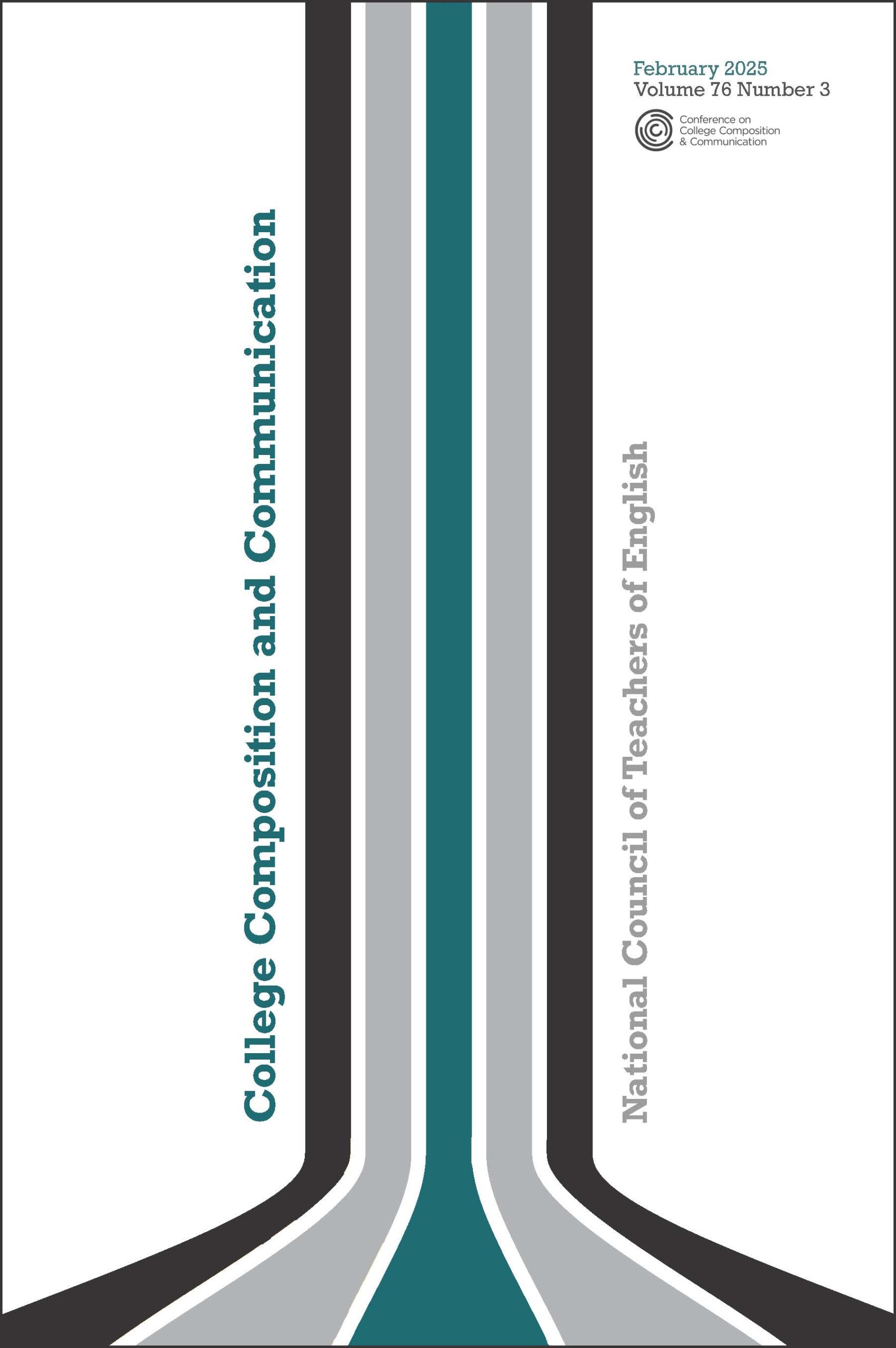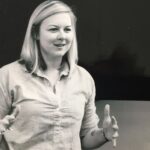Application Deadline: October 10
Purpose: The Conference on College Composition and Communication sponsors the Scholars for the Dream Travel Award to encourage scholarship by historically underrepresented groups. This includes Black, Latinx, Asian, American Indian/Alaska Native, Native Hawaiian, or other Pacific Islander scholars, regardless of citizenship status—persons whose presence and whose contributions are central to the full realization of our professional goals.
CCCC offers selected Scholars for the Dream Travel Award winners travel awards of $1,000 each and sponsors a reception for all award winners. Award winners will have the opportunity to work with career mentors who are CCCC members as part of the award.
Eligibility: If you are from an eligible group and an emerging scholar, you are eligible to apply. Ten Scholars for the Dream Travel Awards will be first-time presenters at CCCC. Up to ten additional awardees may be selected from CCCC members whose proposals have been accepted to the convention, who have presented at no more than three previous CCCC conventions, and who have not previously received a Scholars for the Dream Travel Award.
Award Criteria: The Awards Selection Committee considers originality of research, significance of pedagogical or theoretical contributions to the field, and potential for larger, subsequent projects. Award winners will be notified by early December.
The Awards Selection Committee considers originality of research, significance of pedagogical or theoretical contributions to the field, and potential for larger, subsequent projects. Specifically, the Selection Committee will consider the following:
1. The Problem. The presentation promises to describe a significant problem or issue, meeting one or more of these criteria:
- Timeliness: contributes to a current issue in rhetoric or composition studies.
- Theory: references a specific theoretical framework within rhetoric or composition studies, sharpening concept definitions or presenting alternative viewpoints.
- Research: provides exploration with new research techniques or creative use of known techniques; demonstrates and fills a research void; creates or improves an instrument for observing and analyzing research data.
- Pedagogy: relates specific, creative classroom practices to particular theoretical frames, demonstrating potential for general application (more than a demonstration of a particular personality’s successful pedagogy).
2. The Potential. Whether theory, research, or pedagogy, the presentation should hold promise for future exploration and investigation.
Award Specifics: If you are from a historically underrepresented group, if you are an emerging scholar, and if you would be presenting at CCCC, you may apply by submitting the materials outline below.
Your proposal will be reviewed by the Scholars for the Dream Travel Award Selection Committee. If your proposal is accepted and it meets criteria, you are eligible for a travel award.
Candidates for travel awards should submit an expanded, 3 to 5-page abstract and a completed Scholars for the Dream Eligibility Form (.docx) as a single PDF attachment by October 10, 2025, to the CCCC Liaison at cccc@ncte.org. (Note: You must be be from one or more of the historically underrepresented groups noted above.)
Award winners will be notified by early December.
Other Considerations: In the event that the CCCC Annual Convention moves to an online-only event with no in-person component, recipients will receive a complimentary registration for the convention in lieu of any travel funds.
E-mail questions
Scholars for the Dream Award Winners
2025
Raj Kumar Baral, University of Texas at El Paso
Durga Bhusal, Minnesota State University, Mankato
Thais Rodrigues Cons, The University of Arizona
Anh Dang, The University of Arizona
Suchismita Dutta, The University of Tampa
Cody Hmelar, University of Pittsburgh
Francis Issah, Wayne State University
Eric Nuamah Korankye, Illinois State University
Mehdi Mohammadi, University of New Mexico
Shourya Mohaniya, University of Wisconsin–Madison
Hem Lal Pandey, The University of Texas at El Paso
John Paul Obillos Dela Rosa, Northern Illinois University
Ty’kara Turner, Old Dominion University
Vanessa Garcia Vazquez, Oregon State University
Genoveva A. Vega, Washington State University
Hui Wang, The University of Arizona
Gabriella Wilson-Kopko, Syracuse University
Danna Yunis, San Diego State University
Dan Zhang, University of Illinois Urbana-Champaign
2024
Kofi Adisa, Howard Community College
Edzordzi Agbozo, University of North Carolina Wilmington
Saurabh Anand, University of Georgia
Purna Chandra Bhusal, University of Texas at El Paso
Andy Cheng, University of Cincinnati
Valeria Fernandez, Soka University of America
José Flores, University of Texas at El Paso
Priyanka Ganguly, Virginia Tech
Nicole Golden, Michigan State University
Xuan Jiang, Florida International University
Chloe Leavings, Wayne State University
Rency Luan, University of Waterloo
Nattaporn Luangpipat, University of Wisconsin–Madison
Anselma Prihandita, University of Washington
Sujash Purna, University of Wisconsin–Madison
Kurt Ramos, University of Central Florida
Bridgette Sanders, Florida State University
Jiaxing Shi (Carina), University of Maryland
Justine Trinh, Washington State University
Wei Xu, University of Arizona
2023
Sadia Afrin, University of Waterloo
Cody Ares Baynori, Columbia University
Khadidja Belhadi, Illinois State University
Anuj Gupta, University of Arizona
Lena Hakim, Wayne State University
Meng-Hsien (Neal) Liu, University of Illinois at Urbana-Champaign
Quang Ly, University of Miami
Angela Mack, Texas Christian University
Sherrel McLafferty, Bowling Green State University
Michelle Tram Nguyen, Bowling Green State University
Shankar Paudel, University of Texas at El Paso
María D. Pérez, Texas Christian University
Carolina Roni, Universidad Nacional de La Plata, Buenos Aires, Argentina
Chenxing Xie, North Carolina State University
2022
Kimberly Bain, Florida Atlantic University, Boca Raton
Steven Beardsley, University of California, San Diego
José Cano Jr., Texas Christian University, Fort Worth
Janelle Chu Capwell, University of Arizona, Tucson
Jianfen Chen, Purdue University, West Lafayette, IN
Raquel DeLeon, Texas Tech University, Lubbock
Tabitha Espina, Northeastern University, Boston, MA
Angel Evans, The Ohio State University, Columbus
Wilfredo Flores, Michigan State University, East Lansing
Asmita Ghimire, University of Minnesota Twin Cities
Danie Jules Hallerman, Old Dominion University, Norfolk, VA
Nabila Hijazi, Loyola University Maryland, Baltimore
Raphael Ivan Reyes Juarez, University of Texas at El Paso
Suresh Lohani, University of Texas at El Paso
Misa Kinno Lucyshyn, Columbia University, New York, NY
Shyam B. Pandey, Purdue University, West Lafayette, IN
Nupoor Ranade, George Mason University, Fairfax, VA
Hanan Saadi, Texas A&M International University, Laredo
2021
Kodwo Adam-Moses, Auburn University, AL
Thir B. Budhathoki, University of Arizona, Tucson
Jasmine Corona, California State University, Chico
Meghalee Das, Texas Tech University, Lubbock
Kara Larson, University of South Florida, Tampa
Rashida Mustafa, Teachers College, Columbia University, NY
Nitya Pandey, Florida State University, Tallahassee
Jagadish Paudel, University of Texas at El Paso
Qianqian Zhang-Wu, Northeastern University, Boston, MA
2020
Ariana Brazier, University of Pittsburgh, PA
Wenqi Cui, Indiana University of Pennsylvania
Nicole C. Cunningham-Frisbey, University of New Hampshire, Durham
Samah Elbelazi, Stanford University, CA
Valentina Fahler, University of California Santa Barbara
Subhi Hindi, University of Houston, TX
Cana Uluak Itchuaqiyaq, Utah State University, Logan
Florianne Jimenez, University of Massachusetts Amherst
Salma C. Kalim, Miami University, Oxford, OH
Charmian Lam, Indiana University, Bloomington
Natalie Madruga, University of Central Florida, Orlando
Havva Zorluel Özer, Indiana University of Pennsylvania
Loretta Ramirez, University of California, Irvine
Eric Manuel Rodriguez, Michigan State University, East Lansing
Sherwin Kawahakui Ranchez Sales, Washington State University, Pullman
Pritisha Shrestha, Syracuse University, NY
Sumyat Thu, University of Washington, Seattle
Dhipinder Walia, CUNY Graduate Center, NY
Zhaozhe Wang, Purdue University, West Lafayette, IN
Yebing Zhao, Miami University, Oxford, OH
2019
Laura L. Allen, The Ohio State University, Columbus
Nouf Alshreif, Indiana University of Pennsylvania
Sweta Baniya, Purdue University, West Lafayette, IN
Ashok Bhusal, The University of Texas at El Paso
Liana Clarke, Florida State University, Tallahassee
Christopher Balajadia Garcia, University of Guam, Mangilao
Les Hutchinson, Michigan State University, East Lansing
Charisse S. Iglesias, University of Arizona, Tucson
Tamara Issak, St. John’s University, Queens, NY
Jialei Jiang, Indiana University of Pennsylvania
Soyeon Lee, University of Houston, TX
Shewonda Leger, Michigan State University, East Lansing
Eduardo Mabilog, Nevada State College, Henderson
Charlotte Morgan, Cleveland State University, OH
Bibhushana Poudyal, The University of Texas at El Paso
Sukanto Roy, Indiana University of Pennsylvania
Joanna E. Sanchez-Avila, University of Arizona, Tucson
Karen R. Tellez-Trujillo, New Mexico State University, Las Cruces
Landy Watley, Howard University, Washington, DC
Hua Zhu, Miami University, Oxford, OH
2018
Lama Alharbi, Indiana University of Pennsylvania
Charissa Che, University of Utah, Salt Lake City
Telsha L. Curry, Syracuse University, NY
Khirsten L. Echols, University of Louisville, KY
Marlene Galvan, University of Texas Rio Grande Valley, Edinburg
Christine Garcia, Eastern Connecticut State University, Willimantic
Kimberly C. Harper, North Carolina A&T State University, Greensboro
Brittany S. Hull, Indiana University of Pennsylvania
Ashanka Kumari, University of Louisville, KY
Halcyon M. Lawrence, Georgia Institute of Technology, Atlanta
Shaofei Lu, Case Western Reserve University, Cleveland, OH
Louis M. Maraj, The Ohio State University, Columbus
Samantha McCalla, St. John’s University, Jamaica, NY
Temptaous T. Mckoy, East Carolina University, Greenville, NC
Kendra L. Mitchell, Florida State University, Tallahassee
Vincent Portillo, Syracuse University, NY
Cecilia D. Shelton, East Carolina University, Greenville, NC
Celeste Siqueiros, Murray State University, KY
Teigha Mae Van, Illinois Central College, East Peoria
Karrieann Soto Vega, Syracuse University, NY
2017
Maryam S Alikhani, Teachers College Columbia University, New York, NY
Candace Chambers, University of Alabama, Tuscaloosa
Nina Feng, University of Utah, Salt Lake City
Michelle Grue, University of California, Santa Barbara
Logan Middleton, University of Illinois at Urbana-Champaign
Alejandra Irene Ramírez, University of Arizona, Tucson
Ella Dali Raynor, University of Central Florida, Orlando
Elijah Simmons, Miami University, Oxford, OH
Alison Lau Stephens, University of Oregon, Eugene
Mark Daniel Triana, Washington State University, Pullman
2016
Antonio Byrd, University of Wisconsin-Madison
Quanisha Charles, Indiana University of Pennsylvania
Brandon M. Erby, Penn State University, University Park
André Melvin Jones, Jr., Kean University, Union, NJ
Jamila M. Kareem, University of Louisville, KY
Cona Marshall, Michigan State University, East Lansing
Kelly Medina-López, New Mexico State University, Las Cruces
Consuelo Carr Salas, The University of Texas at El Paso
Danielle Tillman Slaughter, Georgia State University, Atlanta
Sheeba Varkey, St. John’s University, Jamaica, NY
2015
Cara M. Chang, University of Hawai?i at Manoa
Shenika Hankerson, Michigan State University, East Lansing
Erika T. Johnson, Texas Woman’s University, Denton
Ashley L. Newby, Michigan State University, East Lansing
Joy Robinson, Georgia Institute of Technology, Atlanta
Yanira Rodriguez, Syracuse University, NY
Sherita V. Roundtree, The Ohio State University, Columbus
James Chase Sanchez, Texas Christian University, Fort Worth
Rachel Sanchez, Washington State University, Pullman
Dawn N. Hicks Tafari, Winston-Salem State University, NC
2014
Pauline Felicia Baird, Bowling Green State University, OH
April Baker-Bell, Michigan State University, East Lansing
Amanda L. Funk, Kutztown University of Pennsylvania
Arianna M. Howard, The Ohio State University, Columbus
Luciana Junqueira, Georgia State University, Atlanta
Jennifer Lin LeMesurier, University of Washington, Seattle
Kyle T. Mays, University of Illinois at Urbana-Champaign
Reanae McNeal, Texas Woman’s University, Denton
Ana Milena Ribero, University of Arizona, Tucson
Flourice W. Richardson, Illinois State University, Normal
2013
Jada Augustine, California State University, Northridge
Catalina Bartlett, Texas A&M University, College Station
Tara Betts, Binghamton University, NY
Victor Jesus Del Hierro Texas A&M University, College Station
Romeo Garcia, Texas A&M University, Corpus Christi
Michelle Garza, Texas A&M University, Corpus Christi
Laura Martinez, University of Central Florida, Orlando
Indra N. Mukhopadhyay, University of Southern California, Los Angeles
Seonsook Park, New Mexico Highlands University-Rio Rancho
Alma Villanueva, Texas A&M University, College Station
2012
Steven Alvarez, The Graduate Center, City University of New York, NY
Erica Britt, University of Michigan-Flint
Karen Ching Carter, Arizona State University, Tempe
Christina Victoria Cedillo, Northeastern State University-Broken Arrow, OK
Marino Ivo Lopes Fernandes, University of New Hampshire, Durham
Juan M. Gallegos, University of Arizona, Tucson
Eileen Lagman, University of Illinois at Urbana-Champaign
Helen Lee, University of North Carolina at Chapel Hill
Jimisha I. Relerford, Georgia State University, Atlanta
LaToya L. Sawyer, Syracuse University, NY
2011
Sonia C. Arellano, Texas State University-San Marcos
Lamiyah Bahrainwala, Michigan State University, East Lansing
Michael Sterling Burns, University of Illinois at Urbana-Champaign
Lehua Ledbetter, Michigan State University, East Lansing
Kelly McLain, University of Alaska Anchorage
Caroline Prieto, San Francisco State University, CA
Cheyenne Riggs, Texas State University, Austin
Elias Serna, University of California, Riverside
Reva E. Sias, Syracuse University, NY
2010
Tamika Barrett, University of Pittsburgh, PA
Eileen Ain Shams Eddy, Washington State University, Pullman
R. Candace Epps-Robertson, Syracuse University, NY
Fernando Febres, Emerson College, Boston, MA
Regina L. Golar, University of Alabama, Tuscaloosa
ku’ualoha ho’omanawanui, University of Hawai’i at Manoa
Vivian García López, Boise State University, ID
Brandy Nalani McDougall, University of Hawai’i at Manoa
Cruz Medina, University of Arizona, Tucson
Gabriela Raquel Ríos, Texas A&M University, College Station
2009
Maryam Elena Jamali Ashtiani, California State University, Fresno
Lina Buffington, Philadelphia Futures, Pennsylvania
Jason B. Esters, Lincoln University, Pennsylvania
David F. Green, Jr., Penn State University, University Park
Janie Jaramillo-Santoy, Texas Tech University & Texas State Technical College-Harlingen
Marissa M. Juárez, University of Arizona, Tucson
Wen Ma, Le Moyne College, Syracuse, NY
Sarah Nieto Olivas, Texas State University-San Marcos
Bettina Ramón, Texas State University-San Marcos
Michelle Bachelor Robinson, University of Louisville, KY
2008
Qwo-Li Driskill, Michigan State University, East Lansing
Crystal M. Hills, Georgia State University, Atlanta
Donna Hunter, Stanford University, California
Aja Y. Martinez, University of Arizona, Tucson
Natalie A. Martínez, Arizona State University, Tempe
Leslie D. Norris, Rappahannock Community College, Glenns, Virginia
Old Dominion University, Norfolk, Virginia
Kathryn Ortiz, University of Arizona, Tucson
Andrea Osteen, California State University, Fresno
Melissa Berry Pearson, University of South Carolina, Columbia
Staci M. Perryman-Clark, Michigan State University, East Lansing
2007
Maria Bibbs, University of Wisconsin-Madison
Tamika L. Carey, Syracuse University, New York
Korina Jocson, Stanford University, California
Donna King, The Pennsylvania State University, State College
Lydia Balderamos Loskot, New Mexico State University, Las Cruces
Barbara Castillo Noyes, University of Texas at Arlington
Sung Ohm, Ohio University, Athens
Ryan Masaaki Omizo, University of Hawaii at Manoa
Debbie A. Reese, University of Illinois at Urbana-Champaign
Kimberly Thomas, Indiana University of Pennsylvania
2006
Timothy J. Brown, West Chester University, Pennsylvania
Kevin A. Browne, The Pennsylvania State University, College Park
Rachel Carrales, University of Texas at San Antonio
Elizabeth Imende, High Point University, North Carolina
Kendall Leon, Michigan State University, East Lansing
Jolivette Mecenas, University of Hawaii at Manoa
Soncerey L. Montgomery, Winston-Salem State University, North Carolina
Iris Ruiz, University of California, San Diego
Paul Velazquez, Texas State University-San Marcos
Han Yu, Illinois State University, Normal
2005
Cedric D. Burrows, Miami University, Oxford, Ohio
Linh Dich, University of Massachusetts Amherst
Robin Evans, Oklahoma State University, Stillwater
Maisha T. Fisher, Emory University, Atlanta, Georgia
Elisa Marie Norris, Syracuse University, New York
Daisy Pignetti, University of South Florida, Tampa
Eric Darnell Pritchard, University of Wisconsin-Madison
Adina Sanchez-Garcia, University of Miami, Florida
Justin Schapp, Syracuse University, New York
Robyn Tasaka, University of Hawaii at Manoa, Honolulu
2004
JuliAnna Avila, University of California, Berkeley
Jeffrey Duncan-Andrade, University of California, Los Angeles
Ted Hall, Michigan State University, East Lansing
David Kirkland, Michigan State University, East Lansing
Melvette Melvin, Penn State University, State College
Rose Metts, Savannah State University, Georgia
Kelvin Monroe, Washington State University, Pullman
Spencer Salas, University of Georgia, Atlanta
Cecilia Solis-Sublette, Texas A&M University
Sandra Young, University of South Carolina, Columbia
2003
Jacqueline Brown, University of Louisville
Carol Brochin Ceballos, Laredo Community College, Texas
Rene Agustin De los Santos, University of California, Santa Barbara
Nichole Hamai, University of Hawaii, Honolulu
Jungmi Kim, Temple University
Seonjoo Moon, Temple University
Ken Rayes, University of New Orleans
Eunsook Rhee, Temple University
Tonya Scott, Texas A&M University, Commerce
Lillie Whetten, New Mexico State University, Las Cruces
2002
Haivan Hoang, The Ohio State University, Columbus
Carlos Evia, Texas Tech University, Lubbock
Michelle Johnson, Claremont Graduate University, California
Asao Inoue, Washington State University, Pullman
Patricia Trujillo, University of Nebraska, Lincoln
Hilary Owens, California State University, Chico
Derek Landers, Cincinnati State College
Piper Kendrix Williams, Rutgers University
Rachel Brooks-Rather, Ohio University, Athens
Margaret Wong, Quinsagamond Community College, Marlborough, MA
2001
Terry Carter, University of South Carolina
Rose Gubele, Sonoma State University, California
Daniel Justice, University of Nebraska, Lincoln
Rhea Estelle Lathan, University of Wisconsin at Madison
Kim Lee, University of Nebraska, Lincoln
Meredith Lee, University of Hawaii at Manoa
Kathleen McColley, University of Hawaii
Paul Minifee, University of Texas at Austin
Josye Sadler, University of Southern Mississippi
Faye Spencer Maor, Valdosta State University, Georgia
2000
Aesha Adams, Marquette University, Milwaukee
Christina Bell, Montgomery College, Maryland
Rebecca Cisneros, University of Vermont
Lisa Trevino Roy-Davis, Indiana University of Pennsylvania
Avis G. Hewitt, Grand Valley State University, Michigan
Joseph Ng/Eng, Eastern Washington University
Annette Harris-Powell, University of Louisville, Kentucky
Rebecca Small, Sonoma State University, California
Rhonda Robinson Thomas, University of New Hampshire, Durham
Kendra Vaglienti, Texas Woman’s University, Addison
1999
Wilson C. Chen, University of California
Resa Crane Bizzaro, East Carolina University
E. K. Daufin, Alabama State University
Charmin Granger, Miami University
Emily Porcincula Lawsin, California State University, Northridge
Levita D. Mondie, University of Maryland, College Park
Dora Ramirez, University of Nebraska, Lincoln
Kimberly A. Robinson, California State University, San Marcos
Gregory E. Rutledge, University of Wisconsin, Madison
Mae Lombos Wlazlinski, State University of West Georgia, Carrollton
1998
Fred Arroyo, University of Wisconsin, Milwaukee
Steve Chu, Iowa State University
Sheldon George, Boston College, Chestnut Hill, Massachusetts
Serena R. Huffman, University of New Mexico, Alburquerque
Celestine W. Liu, New York University
Cedrick May, University of Texas, Arlington
Elizabeth McHenry, University of Texas, Austin
Diana Elena Moran Molina, University of Wisconsin, Madison
Luana Uluave, Northampton Community College, Bethlehem, Pennsylvania
Linda Walking-Woman, University of Iowa, Iowa City
1997
Cassandra J. Canada, Purdue University, West Lafayette, Indiana
Ginny Carney, University of Kentucky, Lexington
Maria De Jesus Estrada, Indiana University of Pennsylvania
La Tisha Camille Fowlkes, Indiana University of Pennsylvania
Chikako D. Kumamoto, College of DuPage, Glen Ellyln Illinois
Cynthia Mccollie-Lewis, Long Island University, Brooklyn, New York
Donald McCrary, Long Island University, Brooklyn, New York
Charlotte Simmonds-Hammons, Northeastern University, Boston, Massachusetts
A. Tyson Sims, Purdue University, West Lafayette, Indiana
Marion Okawa Sonomura, Brigham Young University, Laie, Hawaii
1996
Erika Aigner-Varoz, University of New Mexico, Albuquerque
Victoria Cliett, Wayne State University, Detroit, Michigan
Renita Duncan, Illinois State University, Normal
Amanda Espinosa-Aguilar, University of Nevada, Reno
Sandra M. Grayson, Bentley College, Waltham, Massachusetts
Terry Haynes, State University of New York/Westchester Community College, Valhalla Joyce Rain Latora, University of Massachusetts, Boston
Lynn A. Casmier-Paz, University of Pittsburgh, Pennsylvania
Gwendolyn Pough, Miami University, Oxford, Ohio
K. Hyoejin Yoon, State University of New York, Albany
1995
Lena Ampadu, University of Maryland, College Park
María C. M. de Guerrero, Inter American University of Puerto Rico
Phyllis Pearson Elmore, North Lake College, Dallas, Texas
Carlton Floyd, University of Idaho, Moscow
Janice Gould, University of New Mexico, Albuquerque
David Holmes, Pepperdine University, Malibu, California
Terese Monberg, Rensselaer Polytechnic Institute, Troy, New York
Shondel Nero, Long Island University, New York Pata Suyemoto, University of Pennsylvania, Philadelphia
José L. Torres-Padilla, University of Puerto Rico, Cayey
1994
Jennifer Barfield, University of North Carolina, Wilmington
Kisha Brown, Long Island University, Brooklyn, New York
José Irizarry, University of Puerto Rico, Mayguez
Susan Kimoto, Cowell College, Santa Cruz, California
Alison O. Lee, College of San Mateo Tohcone College, San Francisco, California
Michelle McIver-Bell, Fayetteville State University, North Carolina
Natalia Apostolos Menendez, Foothill College, Los Altos Hills, California
Malea Powell, Miami University, Oxford, Ohio
Elaine Richardson, Michigan State University, East Lansing
Patricia Joan Saunders, University of Pittsburgh, Pennsylvania
1993
Meta G. Carstaphen, Texas Woman’s University, Denton
Louise M. Connal, University of Arizona, Tuscon
Evelyn Flores, University of Guam, Barrigada
Sharon Gamble, City College of New York, New York
Lisa M. Gonsalves, University of Massachusetts, Boston
Renee Moreno, University of Michigan, Ann Arbor
Jeryl Prescott, University of South Florida, Tampa
George Q. Xu, Clarion University of Pennsylvania, Clarion











